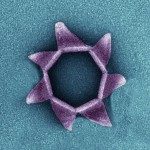Lien vers Pubmed [PMID] – 16154357
Trends Microbiol. 2005 Nov;13(11):535-42
Since the discovery of the Archaea–the third domain of life–by Woese and colleagues in 1977, the subsequent developments in molecular and cell biology, and also genomics, have strongly reinforced the view that archaea and eukarya co-evolved, separately from bacteria, over a long time. However, when one examines the archaeal viruses, the picture appears complex. Most viruses that are known to infect members of the kingdom Euryarchaeota resemble bacterial viruses, whereas those associated with the kingdom Crenarchaeota show little resemblance to either bacterial or eukaryal viruses. This review summarizes our current knowledge of this group of exceptional and highly diverse archaeal viruses.

